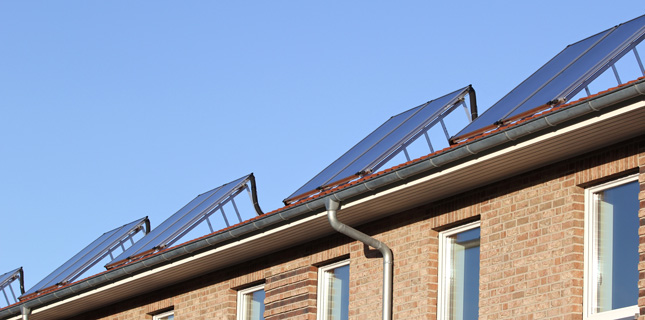

The Solar Trade Association (STA) has protested a government consultation that is proposing to remove solar thermal technologies from the Renewable Heat Incentive (RHI).
The consultation, published on 3 March, is proposing to end RHI support for solar thermal hot water heating when the scheme is overhauled next year.
Paul Barwell, chief executive officer of the Solar Trade Association, said: "This proposal simply doesn't make sense. The government acknowledges the many benefits of solar thermal, yet proposes singling it out for the removal of financial support. With UK renewable heat deployment falling desperately behind target, government should be full square behind this technology as part of a strategic plan to permanently bring down heating costs for British families.
"Discriminating against this technology would send a terrible message to householders, and it would have very serious ramifications for the British solar thermal sector. Manufacturers of solar thermal equipment, including cylinder manufacturers as well as installers, risk a full scale winding-up of their sector. We are urging government to think again, particularly since sales enquiries are on the rise."
The government's proposal comes as the House of Commons Energy and Climate Change committee heavily criticized it for damaging investor confidence in UK energy infrastructure because of a "lack of transparency in the decision-making process" as well as "policy inconsistency".
Energy Secretary Amber Rudd has made repeated statements that renewable heat is the major focus for the UK's renewables policy given the UK is off track on its 2020 renewables targets. In 2014 green sources provided only 4.8% of the country's heat, which puts the UK way behind its self-imposed target of 12% renewable heat by 2020.
Solar thermal is one of the more established and accessible renewable energy technologies, with over 350GW of global capacity, considerably more than the global capacity for solar PV. Its applications have expanded into space heating, community heating, district heating, hotels, hospitals and industrial processes. Solar thermal also works effectively alongside other renewables technologies.
Gordon Watts, sustainability manager at South Yorkshire Housing Association, said: "The use of solar thermal panels to provide hot water in some of our existing housing schemes helps to keep our customers' gas bills down, and this technology and other renewables continue to be important options we consider as part of our stock development and improvement plans. Continuation of the RHI and the Feed-in Tariff is important for solar thermal and other renewables until these markets more fully mature."
The consultation document describes solar thermal as the least cost-effective of the four technology types supported by the RHI, as while the system accounts for 17% of the total accreditations made under the scheme, it accounts for just 2% of heat generated.
The document also notes that during evaluation of the RHI, around half of the owner-occupiers asked said they would have installed the technology anyway, whether it was eligible for RHI support or not. As a result, the consultation documents states solar thermal "represents poor value for money for taxpayers".
The UK solar industry, which the STA says is dominated by domestic systems, slumped during a policy hiatus lasting from 2010 to 2014. It was not until the first half of 2014 that the Renewable Heat Incentive was introduced for domestic solar thermal, by which time the UK market had halved. STA analysis shows there has been an 88% increase in monthly solar thermal sales enquiries among its membership compared to this time last year.
The full consultation proposals can be found here (with the section dealing with solar thermal on p47) - https://www.gov.uk/government/uploads/system/uploads/attachment_data/file/505127/The_Renewable_Heat_Incentive_-_A_reformed_and_refocussed_scheme.pdf.
The consultation closes on 27 April, 2016.
If you'd like to keep up-to-date with the latest developments in the heating and plumbing industry, why not subscribe to our weekly newsletters? Just click the button below and you can ensure all the latest industry news and new product information lands in your inbox every week.